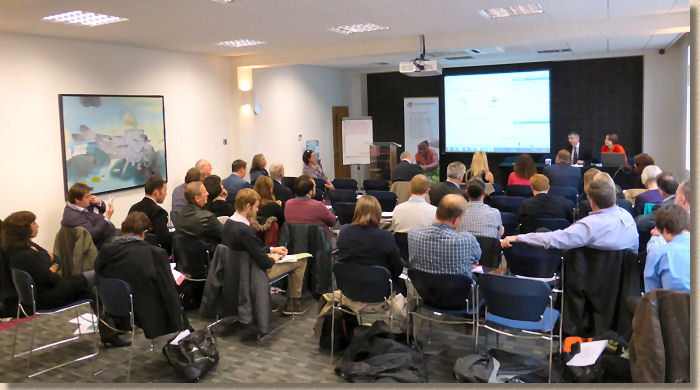Ethical Trading 2013
The Ethical Trade Initiative (ETI) has been around for a few years and it's a scheme that will be vaguely familiar to many without any of us being fully aware of what it means and what it does. We've all seen the logo....somewhere....was it on that pack of tea bags or in that brochure from....errr....one of them paving suppliers?
In fact, the ETI works across a wide range of traded goods, most visibly clothes and textiles, but for our purposes, the most pertinent example will be with the supply of stone paving from various overseas locations. Over recent years, more and more suppliers of note have been featuring the logo in their publications and making all the correct worthy noises, but does it actually mean anything or is it just another "ethicon", a further example of corporate and political box-ticking with no real content. An open meeting in that London on Thursday of last week afforded the chance to find out.
The backstory is that Britain's political class have seen fit to become the first country in the world to fully endorse, and to back with public money, the UN Guiding Principles on Business and Human Rights which gives the ETI the chance to both push the agenda amongst the consumers in Britain, but, more importantly, to drive positive changes on the ground overseas.
A dozen or so member companies recognised that the common factor they share is they all supply stone from Rajasthan in north-west India, and so rather than have minimal impact in a dozen far-flung locations, they set up the Rajasthan Stone Working Group (RSWG) and decided to focus their efforts on this one area. If they can improve worker conditions and employment practices in this hub of the Indian stone supply industry, it should be easier to transfer it to other states, other nations. With the funding from HM Government, they can put staff on the ground in Rajasthan and directly influence those companies wanting to supply British distributors.
Wonderful, isn't it?
I wish I could be certain. Only a heartless ghoul would not support the aims of the ETI. None of us, I hope, want to see child or slave/bonded labour used to produce the paving we lay. Surely we all want to be reassured that workers have rights of association, access to health, safety and welfare, be paid a living wage and have their rights to family life respected, and so an organisation that actively works to ensure that all this really happens has to be worth supporting doesn't it?
I thought so, but apparently, HM Government, now that it's handed over a few quid, couldn't be arsed to send along anyone to reinforce their commitment, and the absence of anyone or any dosh from the Indian High Commission or Indian trade bodies served only to undermine the impassioned and eloquent case made by the speakers.
And this is what worries me. There's only Britain pushing this. It's a UN notion that was unanimously adopted by the UN, but no other UN members are lifting a finger. Hey! They've rubber-stamped a document and had a big dinner, what more do you expect from politicians? Real action and genuine concern? Are you really that naïve?
The meeting revealed that, of all the stone quarried in Rajasthan, only 4% is exported. 96% of production is for domestic use in India, so the export industry is a relatively small and under-powered lobby. And of that 4%, what percentage comes to Britain? If the export trade is an afterthought in India, how much whooomph do you think British buyers will have? Somewhere just above Sweet FA I imagine!
If this was an EU initiative, maybe we could have an influence, but Britain on its own, with all the connotations of colonialism, of a wealthy(ish) western nation imposing its liberal values on an eastern emerging power – how well received do you think that would be?

The new rules which HM Government claims will be enacted will require stone suppliers to be completely and totally aware of the whos, whys, whens and wherefores of their entire supply chain. The claim is that there'll be no hiding place for distributors, no opportunity for retailers to say " Oh! I got it from a bloke at Tilbury, so worker conditions in Rajasthan are nowt to do with me, guv ". Every business selling imported stone on the British market will be required to undertake what is referred to as "due diligence". They will be expected to show that they have checked and double checked every link in their supply chain. They will be expected to show that the quarry follows ETI standards, that the processing yards follow ETI standards, as do the transporters, the export agents, the crate makers, the fumigators, even the tea boys. All this will drive up employment standards, in theory, and ensure that all the imported stone sold in Britain has been responsible for improving the lot of the workers back in India.
Brilliant, eh? We can all pat ourselves on the back for being so caring. But perhaps those businesses who only sell a handful of containers of stone each year might want to hold off on the back-slapping for a moment. All this due diligence and supply chain checking is all well and good if you're flogging a thousand containers a year. You can probably afford to have someone in your organisation do nothing other than check out the links and be duly diligent, but for the smaller trader, how realistic is this?
I can't see how anyone with a turnover under, say, 5 million quid, can afford to carry out all these checks. If we postulate that the due diligence will, for arguments sake (and I pluck these figures out of fresh air), cost £25,000 pa and you sell 500,000 square metres each year, that's 5p/m², but if you're only selling 5,000m² a year, then that's a fiver per metre, and all of a sudden your margins have disappeared and your prices are uncompetitive.
To remain in business, the only option would be to source your stock not from your usual contacts in India, but via an agent who has done all the due diligence and checked the supply chain and tested the bogs in the quarry outside Jaipur. We are faced with a less open market. We are faced with a scenario where we are putting control of the market into the hands of a few traders who are rich enough, powerful enough, and organised enough to fulfil the new obligations.
And all this assumes that our beloved HM Government actually enforces the legislation. We've seen this before. Politicians get a bee in their collective bonnet about some issue and are spurred into taking action and handing out public money, which they then assume means they can move on to another vote-winning issue with a clear conscience having effectively solved the previous problem. Think back to 2008 and all the hullabaloo about permeable driveways and sustainable drainage. This was going to arrest the loss of front gardens in that London and reduce the risk of flooding throughout the land. They cobbled together the most permeable and laughable piece of legislation imaginable, made some vacuous appearances on The One Show, and then did buggerall. There's no enforcement, no due diligence, no real change. Permeable paving for driveways remains the exception rather than the rule, cowboy contractors stick three lengths of a 10 quid linear channel connected to fresh earth at the threshold of a driveway and homeowners think they've saved the planet. If you want something really buggering up, get the politicians to legislate it!

And finally, how concerned are the so-called Great British Public? From the feedback to this website, and from discussions with contractors and stone suppliers, I sense there's no real concern over the ethics of stone, just the price. Sure, if we pointed out that such-and-such a stone was produced by children in filthy conditions with appalling pay and no job security, many folk would shy away, but almost no-one asks about the origin. If there's a sticker that mentions 'ethics' or 'green' or 'sustainable', then that endows the right not to be concerned about anything, because it's a sticker. If it's a quid more but it has a sticker, then it's probably a 'good thing'. But if we tell customers and clients that we need 5 or 7 or 10 quid a metre more because the stone we use has been diligently dued and lovingly produced by happy, smiling workers who love nothing better than to work with natural materials, will they choose that or will they go for the cheaper option with no questions asked?
It's a dilemma for me and, I suspect, for most people. I'm 100% supportive of the aims of the ETI but I'm genuinely concerned that it's a utopia we'll never reach. I want to be reassured that the stone I see being laid to the streets, the drives, the patios of this nation comes from a genuinely ethical and accredited source, but there's just too much stacked against that ever happening just at the moment.
If we can overcome the scepticism and penny-pinching habits of the clients, and if we can structure the market to prevent a few large agents dominating the supply chain to their own advantage, and if we could be assured that the government would actively enforce the legislation and police the market, we are still faced with the problem that this is one, tiny, pretty insignificant speck of an island with a relatively small budget making demands of another, larger, more populous and economically stronger nation where corruption is as much a part of the culture as are cows blocking the traffic. It ain't gonna happen, and that's a real, real shame!
However, that doesn't mean we should do nothing. If the laudable efforts of the ETI improve the working life of just one family in Rajasthan, that's better than doing nothing, isn't it? But at what cost?
As a consumer, I want to know that for every pound extra I spend on my paving and walling, a pound's worth of benefit accrues on the ground in India. Hell, I want to know that for every extra pound I spend, five, or ten pound's worth of improvements take place. I don't want this to be a simple salve for my conscience, I want to know that it's making a real difference and the only way to be sure that happens is for concerted action from a group of influential nations. Britain on its own, as well-meaning as it tries to be, is simply not enough.

Download the full ETI Press Release


